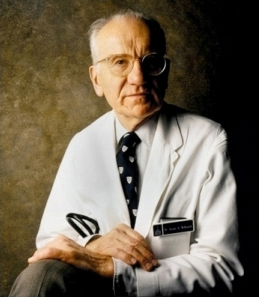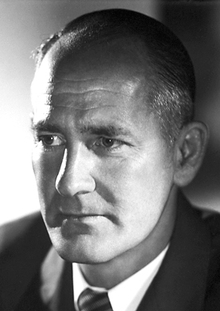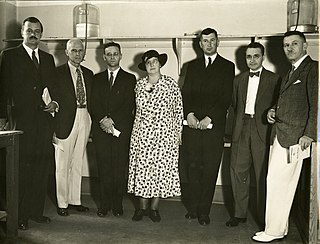Genetic counseling is the process of advising individuals and families affected by or at risk of genetic disorders to help them understand and adapt to the medical, psychological and familial implications of genetic contributions to disease. The process integrates:

Victor Almon McKusick was an American internist and medical geneticist, and Professor of Medicine at the Johns Hopkins Hospital, Baltimore. He was a proponent of the mapping of the human genome due to its use for studying congenital diseases. He is well known for his studies of the Amish. He was the original author and, until his death, remained chief editor of Mendelian Inheritance in Man (MIM) and its online counterpart Online Mendelian Inheritance in Man (OMIM). He is widely known as the "father of medical genetics".

George Wells Beadle was an American geneticist. In 1958 he shared one-half of the Nobel Prize in Physiology or Medicine with Edward Tatum for their discovery of the role of genes in regulating biochemical events within cells. He also served as the 7th President of the University of Chicago.
Ahmad Said Teebi was a Palestinian, born in Lebanon, clinical geneticist who studied and practiced in several countries, ending his career in Canada and the United States.
A medical speciality is a branch of medical practice that is focused on a defined group of patients, diseases, skills, or philosophy. Examples include children (pediatrics), cancer (oncology), laboratory medicine (pathology), or primary care. After completing medical school, physicians or surgeons usually further their medical education in a specific specialty of medicine by completing a multiple-year residency to become a medical specialist.

Bernadine Patricia Healy was an American cardiologist, academic physician, and the first female director of the National Institutes of Health (NIH). She was professor of medicine, assistant dean and cardiac care chief at Johns Hopkins University, chair of the Research Division of Cleveland Clinic, and professor and dean of the College of Medicine and Public Health at Ohio State University, and served on the Board of Overseers of Harvard University and as president of the American Red Cross and the American Heart Association. She was health editor and columnist for U.S. News & World Report and a well-known commentator in the news media on health issues.

Medical genetics is the branch of medicine that involves the diagnosis and management of hereditary disorders. Medical genetics differs from human genetics in that human genetics is a field of scientific research that may or may not apply to medicine, while medical genetics refers to the application of genetics to medical care. For example, research on the causes and inheritance of genetic disorders would be considered within both human genetics and medical genetics, while the diagnosis, management, and counselling people with genetic disorders would be considered part of medical genetics.
Stanley Michael Gartler is a cell and molecular biologist and human geneticist. He was the first scientist to offer conclusive evidence for the clonality of human cancers. He showed that HeLa cells had contaminated many cell lines thought to be unique. Stanley Gartler is currently Professor Emeritus of Medicine and Genome Sciences at the University of Washington.
The Leadership Conference on Civil and Human Rights, formerly called the Leadership Conference on Civil Rights, is an umbrella group of American civil rights interest groups.

The Genetic Information Nondiscrimination Act of 2008, is an Act of Congress in the United States designed to prohibit some types of genetic discrimination. The act bars the use of genetic information in health insurance and employment: it prohibits group health plans and health insurers from denying coverage to a healthy individual or charging that person higher premiums based solely on a genetic predisposition to developing a disease in the future, and it bars employers from using individuals' genetic information when making hiring, firing, job placement, or promotion decisions. Senator Ted Kennedy called it the "first major new civil rights bill of the new century." The Act contains amendments to the Employee Retirement Income Security Act of 1974 and the Internal Revenue Code of 1986.

Joseph F. Fraumeni Jr. is an American physician and cancer researcher. Born in Boston, he received an A.B. from Harvard College, an M.D. from Duke University, and an M.Sc. in epidemiology from the Harvard School of Public Health. He completed his medical residency at Johns Hopkins Hospital and Memorial Sloan-Kettering Cancer Center. He then joined the National Cancer Institute at the National Institutes of Health in 1962 as a commissioned officer of the U.S. Public Health Service, becoming the founding Director of the Division of Cancer Epidemiology and Genetics in 1995. He stepped down from this position in 2012 to become a senior investigator and advisor to the National Cancer Institute.

Edison T. Liu, M.D., is the president and CEO of The Jackson Laboratory, and was the president of Human Genome Organization, HUGO from 2007-2013.

Alan Edward Guttmacher, M.D. was the director of the National Institute of Child Health (NICHD), one of the 27 institutes and centers that comprise the National Institutes of Health (NIH). In that capacity, he oversaw the institute’s activities as the focal point at the NIH for research in pediatric health and development, maternal health, reproductive health, intellectual and developmental disabilities, and rehabilitation medicine, among other areas.
National Coalition on Health Care(NCHC) is a coalition of groups working to achieve comprehensive health system reform. Founded in 1990 by Dr. Henry E. Simmons, M.D., NCHC is a non-profit alliance of more than 80 organizations.

Jewel Plummer Cobb was an American biologist, cancer researcher, professor, dean, and academic administrator. She contributed to the field of cancer research by studying the cure for melanoma. Cobb was an advocate for increasing the representation of women and students of color in universities, and she created programs to support students interested in pursuing graduate school.
Professor Michael Boehnke is a Biostatistician at the University of Michigan School of Public Health, where he directs the Center for Statistical Genetics. His research focuses on the genetic dissection of complex traits; in a career spanning 25 years, he has developed methods for analysis of human pedigrees, examined the history of breast cancer in genetically at risk individuals, and contributed important discoveries on the genetics of type 2 diabetes and related traits, such as obesity and blood lipid levels.
Arno Motulsky was a professor of medical genetics and genome sciences at the University of Washington. Through his research, writing and mentoring, he helped create and define the field of medical genetics. He is also known as the "father of pharmacogenomics" based on his report in 1957 of negative drug responses in some patients depending upon their genetics at critical enzymes.[2]

Elaine Ann Ostrander is an American geneticist at the National Human Genome Research Institute (NHGRI) of the National Institutes of Health (NIH) in Bethesda, Maryland. She holds a number of professional academic appointments, currently serving as Distinguished and Senior Investigator and head of the NHGRI Section of Comparative Genomics; and Chief of the Cancer Genetics and Comparative Genomics Branch. She is known for her research on prostate cancer susceptibility in humans and for conducting genetic investigations with the Canis familiaris, the domestic dog model, which she has used to study disease susceptibility and frequency and other aspects of natural variation across mammals. In 2007, her laboratory showed that much of the variation in body size of domestic dogs is due to sequence changes in a single gene encoding a growth-promoting protein.

Madge Macklin was an American physician known for her work in the field of medical genetics, efforts to make genetics a part of medical curriculum, and participation in the eugenics movement.

Joan Ellen Bailey-Wilson is an American statistical geneticist. She is a senior investigator and co-chief of the Computational and Statistical Genomic Branch of the National Human Genome Research Institute.











